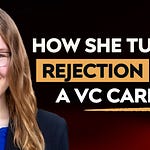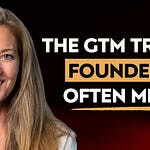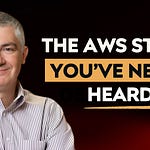The venture capital landscape is shifting fast — and few people have had a better vantage point than Damir Ibrahimagić Kopinić, co-founder and CEO of G Plus Quant. With decades of experience spanning asset management, trading, blockchain, and now early-stage venture, Damir has seen how markets evolve and how capital allocators think.
In a recent Ignite Podcast episode, Damir sat down with Brian Bell to discuss how startups can better connect with investors, why AI is transforming the venture industry, and what founders and fund managers alike should know about LP dynamics. Here are the highlights.
From Asset Management to Startups
Damir began his career in traditional finance — trading, asset management, and brokerage. But after meeting founders seeking institutional capital, he was hooked by their energy and vision. That experience inspired him to help startups secure funding and eventually co-found G Plus Quant, a consultancy that connects promising startups with venture funds, LPs, and family offices.
Why Founders Struggle to Connect with Investors
One of Damir’s central messages is that founders often underestimate how much preparation is required to raise capital. Investors expect:
A clear, well-structured pitch deck
Professional data rooms
Demonstrated traction or a proven team with prior exits
Too often, technical founders can talk endlessly about their product but fail to “sell” themselves and their vision in a way investors find compelling.
The AI Obsession — and the Overlooked Opportunities
In 2025, AI dominates venture capital conversations. According to Damir, without an AI angle, many investors won’t even look at a pitch deck. But this creates a distortion: solid, non-AI businesses are being overlooked — and may now be available at attractive valuations.
Still, he believes AI is a true game-changer, especially in fintech, legal tech, and agent-based automation where teams of ten can be reduced to one. This creates new dynamics: startups need less capital to scale, which in turn pressures venture funds to rethink fee structures and fund sizes.
LPs vs. Family Offices: Different Worlds
Damir draws a sharp distinction between capital sources:
Family offices often bring emotion and personality into decision-making. Each is unique, making the process highly relationship-driven.
Institutional LPs are more rigid, requiring formal presentations, proven track records, and a long trust-building process.
Both, however, are increasingly cautious given macroeconomic uncertainty, interest rate volatility, and geopolitical risks.
Niche vs. Generalist Funds: Why Focus Wins
For emerging fund managers, Damir stresses the importance of having an edge. Generalist strategies are nearly impossible to execute at small scale when competing with giants like Sequoia or Andreessen Horowitz. Instead, being niche — whether by sector, stage, or geography — offers credibility and differentiation.
He also highlights that funds in the $50–150 million AUM range, typically around fund three, are currently the most attractive to LPs. They’re large enough to participate meaningfully in deals but nimble enough to adapt.
The Rise of AI-Driven Venture Capital
One of the most fascinating parts of the conversation is Damir’s vision for algorithmic venture capital. He believes most due diligence, deal screening, and even investment processes will be automated within a few years.
AI can now outperform MBAs in screening pitch decks and data rooms.
Founders can use AI to create stronger decks, reach customers faster, and accelerate product-market fit.
The bottleneck is shifting from analysis to relationships and trust — areas where human investors still matter most.
Damir envisions funds run with just a handful of people, supported by AI agents that work 24/7. The competitive advantage will no longer be in analysis, but in network access and the personal touch.
Europe vs. U.S. Venture
Damir also contrasts the two ecosystems:
U.S. startups benefit from abundant capital, especially at later stages.
Europe is more fragmented, risk-averse, and conservative, though often able to invest at lower valuations.
Israeli startups continue to look to the U.S. for growth capital, bypassing European hubs altogether.
Looking Ahead: Liquidity, Secondaries, and AI-Driven Efficiency
Damir believes secondaries will become an increasingly important tool to create liquidity in a world where IPO markets remain frozen. For fund managers, returning even partial capital early can strengthen LP relationships and improve chances of raising subsequent funds.
He also predicts AI will continue to reshape both startups and venture firms — creating a leaner, faster, more efficient ecosystem where speed and execution are the ultimate moats.
Key Takeaways
Founders must do their homework before pitching: clear decks, data, and traction are non-negotiable.
AI is transforming both startups and venture capital, enabling leaner operations and more efficient scaling.
LPs and family offices approach investing differently — relationships and trust are critical for both.
Niche funds with $50–150M AUM are in a sweet spot for LP attention.
The future of venture may be AI-powered, but human relationships still matter.
👂🎧 Watch, listen, and follow on your favorite platform: https://tr.ee/S2ayrbx_fL
🙏 Join the conversation on your favorite social network: https://linktr.ee/theignitepodcast
Chapters:
00:01 – From asset management to early-stage venture: Damir’s journey
02:20 – ICOs, blockchain, and lessons from the early crypto wave
03:06 – The #1 mistake founders make when pitching investors
05:14 – Why AI dominates investor attention in 2025
07:17 – How AI is making startups leaner and more capital efficient
08:04 – The overlooked value in non-AI deals
09:56 – The risk of AI startups becoming obsolete overnight
11:19 – Vertical vs. sub-vertical AI opportunities (e.g., legal tech)
11:59 – Startups scaling to $100M ARR with tiny teams
13:19 – Family offices vs. institutional LPs: how they differ
15:54 – Why warm intros matter and cold outreach fails
17:33 – Niche vs. generalist funds: which strategy works for emerging managers
22:22 – How LPs evaluate fund decks, deal flow, and GP presentation
24:41 – Why raising a $30–50M fund can be harder than $100M+
31:27 – The “sweet spot” for funds: $50–150M at fund three
34:40 – Shifts in management fees, carry, and LP negotiations
39:51 – The rise of algorithmic VC funds and AI-powered due diligence
43:42 – Are large VC teams obsolete in the age of AI?
46:18 – Automating deal screening and data rooms with AI agents
50:19 – Back-testing with AI: learning from startup successes and failures
53:47 – How AI accelerates both VCs and founders
54:47 – Fees vs. carry: what LPs really want
57:48 – Strategies for liquidity, secondaries, and returning capital to LPs
01:01:05 – Europe vs. U.S. venture ecosystems post-2023 reset










